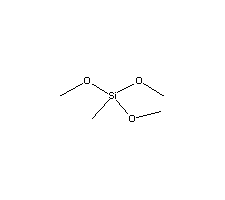Methyltrimethoxysilane Suppliers, Methyltrimethoxysilane Manufacturers.
Zhejiang Feidian Chemical Co., Ltd.
Methyltrimethoxysilane
Category :
Organic chemicals and DerivativesSynonyms :
Trimethoxy(methyl)silane;Methytrimethoxysilane;MTMS;CAS NO :
1185-55-3EC NO :
214-685-0Molecular Formula :
C4H12O3SiMolecular Weight :
136.2218Main Specifications :
InChI :
InChI=1/C4H12O3Si/c1-5-4(8,6-2)7-3/h1-3,8H3Product description :
Silane coupling agent KH-370
Product: Silane coupling Agent KH-370
Chemical Name: Methyltrimethoxysilane
CAS No.: 1185-55-3
Structure formula:Introduction:
KH-370, an alkylalkoxysilane is an important component in sol-gel system. It is a colorless liquid.
Typical Physical Properties:
CAS No.: 1185-55-3
Molecular Weight: 136.22
Boiling Point<760mmHg>: 101
Flash Point: 12
Color and appearance: colorless clear liquid Density<20/20>: 0.950 Refractive Index<20>: 1.369+0.0005
Min. Purity: 98.0%Applications:
As a crosslinking agent for room temperature cured silicone rubber, coupling agent for glass fiber and SiO2, a strengthing treatment agent for plastic-layer pressing material.
The most common alkoxy crosslinkers are methoxy or ethoxy silanes due to their high reactivity. The reaction precedes by nucleophilic substitution usually in the presence of acid or base catalysts. Alkoxides react directly with silanols or with water to produce silanols. The newly formed silanols can react with other alkoxides or self-condense to produce a siloxane bond and water. When an acid catalyst is used, protonation of the alkoxysilane increases the reactivity of the leaving group. When a base catalyst is used, deprotonation of the silanol forms a reactive silonate anion. The by-product of the reaction is an alcohol. Common metal catalysts for these reactions are alkoxytitanium derivatives and dibutyltin dicarboxylates.Molecular Structure :

About Us - Top Products- Partner with Us - Contact Us - Help - Sitemap
ChemNet is a registered trademark of Zhejiang NetSun Co., Ltd.
